
Quantum Computing: What Developers Need to Know
Introduction
Quantum computing is one of the most exciting developments in tech today. Unlike traditional computers that use bits (0s and 1s), quantum computers use qubits, which can represent both 0 and 1 at the same time. This allows them to process information in a completely different and much faster way. Companies like IBM, Google, and Microsoft are already running real quantum machines and offering cloud-based access to experiment with them.
As a developer, staying ahead of emerging technologies like this can help you future-proof your skills and explore new career paths in the process. In this article, we’ll cover the basics of quantum computing, how it works, the programming languages and tools you can start using today, and where to find resources to begin your learning journey.
How Quantum Computing Works
Quantum computing may sound complex, but the basic idea is easier to understand when broken down. Instead of using the regular bits found in traditional computers, quantum computers use qubits. These qubits can be 0, 1, or both at the same time because of a property called superposition. This means quantum computers can explore many possible solutions at once, making them powerful for solving difficult problems.
Another important concept is entanglement. When qubits are entangled, the state of one affects the other, even if they are far apart. This connection helps quantum computers process and share information more efficiently.
Here’s a simple way to think about it:
- A classical computer is like checking every door one by one to find the right key.
- A quantum computer can check multiple doors at once, saving time and computing power.
Quantum computers perform calculations using quantum gates, which are similar to logic gates in normal computers but work on qubits instead of bits. These gates change the state of qubits to create quantum algorithms.
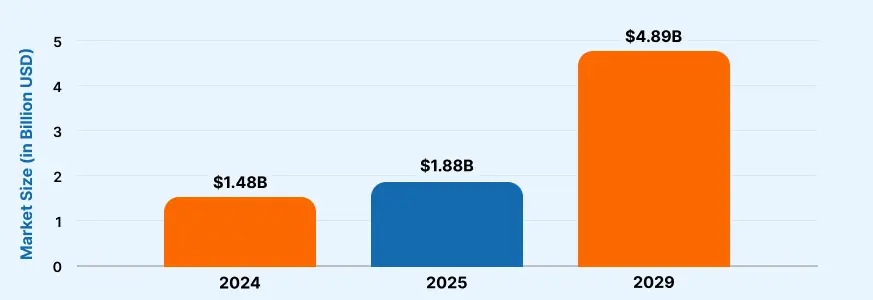
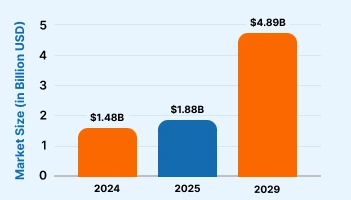
Even though the technology is still developing, it’s already being tested in fields like cybersecurity, chemistry, and finance. According to a 2025 report, the total global quantum technology market will reach $1.88 billion in 2025, representing a 27.3% increase from $1.48 billion in 2024. Projections indicate the market could reach $4.89 billion by 2029, driven by increased computational power and demand for secure communication.
What Skills Developers Need for Quantum Computing
Quantum computing requires a different way of thinking compared to regular programming. While you don’t need to be a physicist to get started, some key skills and concepts can help you prepare for real-world quantum development.
 Understanding of Basic Quantum Concepts
Understanding of Basic Quantum Concepts
Developers should know the basics of quantum mechanics such as:
- Qubits: The basic unit of quantum information
- Superposition: Ability of qubits to be in multiple states at once
- Entanglement: When qubits are linked and affect each other
- Quantum Gates: Operations that change qubit states
You don’t need to understand the complete math behind them, but knowing what they do is helpful for coding quantum algorithms.
 Familiarity with Quantum Programming Languages
Familiarity with Quantum Programming Languages
Unlike Python or JavaScript, quantum computers have their own languages and platforms, such as:
- Q# by Microsoft
- Cirq by Google
- Qiskit by IBM
Focusing on one or two platforms is a great way to start. They also offer simulators if you don’t have access to a real quantum system.
 Linear Algebra and Math Basics
Linear Algebra and Math Basics
Some level of math is helpful, especially linear algebra (matrices, vectors) because quantum operations use these concepts. You don’t need deep academic training, but comfort with math symbols and matrix operations will help you understand how qubits behave.
 Problem-Solving and Algorithmic Thinking
Problem-Solving and Algorithmic Thinking
Quantum computing is all about solving specific types of problems faster than classical computers. Working on regular algorithms, puzzles, and logic problems can build a foundation for thinking creatively in quantum development.
 Experience with Cloud Platforms
Experience with Cloud Platforms
Most quantum development happens on cloud platforms like IBM Quantum Experience, Azure Quantum, or Amazon Braket. Familiarity with cloud-based tools and APIs will make it easier to run and test quantum programs.
 Continuous Learning Mindset
Continuous Learning Mindset
Quantum computing is evolving, so staying updated through articles, courses, and communities is important. Developers who are curious and open to learning new concepts will find quantum computing exciting and rewarding.
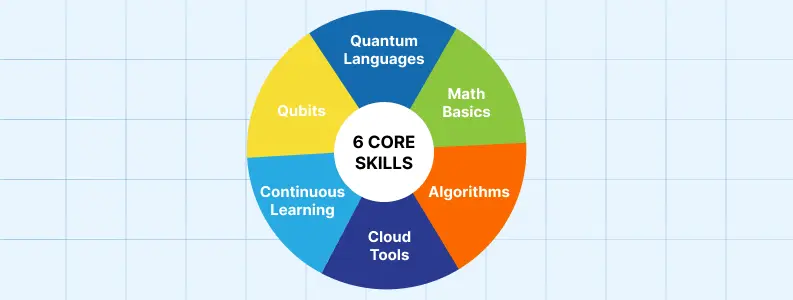
Top Quantum Programming Tools and Platforms
Getting started with quantum computing is easier today because many leading tech companies offer free or low-cost tools for developers to learn, experiment, and build quantum-based applications. Here’s a look at some popular platforms you should know about in 2025:
 IBM Quantum Experience (Qiskit)
IBM Quantum Experience (Qiskit)
Qiskit is an open-source quantum programming framework by IBM. It allows developers to write quantum algorithms in Python and test them on real quantum computers through the IBM cloud.
Why it’s useful:
- Offers free access to quantum simulators and hardware
- Beginner-friendly tutorials and courses
- Strong global community support
 Microsoft Azure Quantum (Q#)
Microsoft Azure Quantum (Q#)
Azure Quantum lets developers run quantum programs using Q#, a language designed by Microsoft. It connects you to quantum hardware from partners like IonQ and Quantinuum.
Why it’s useful:
- Works well with .NET and Visual Studio
- Lets you build hybrid apps using both classical and quantum code
 Google Cirq
Google Cirq
Cirq helps developers write, simulate, and run quantum circuits, especially for their Sycamore processor. It’s designed for quantum machine learning and optimization research.
Why it’s useful:
- Python-based and compatible with TensorFlow Quantum
- Focused on algorithm development
 Amazon Braket
Amazon Braket
Amazon Braket is a fully managed quantum computing service by AWS. You can build, test, and run quantum programs using hardware from different providers.
Why it’s useful:
- Pay-as-you-go model
- Supports both circuit-based and annealing quantum devices
 D-Wave Ocean SDK
D-Wave Ocean SDK
D-Wave offers a quantum annealer, a different kind of quantum machine used for solving optimization problems. Their Ocean SDK lets you write code in Python to access this hardware.
Why it’s useful:
- Ideal for logistics, scheduling, and supply chain challenges
- Good for real-world optimization tasks
When Will Quantum Computing Be Mainstream?
Quantum computing is advancing, but it has not reached mainstream use yet. Most experts expect the full impact to arrive in stages over the next decade. Developers and businesses are already preparing because the change could be closer than it seems.
 What is happening now
What is happening now
- Early access is available through cloud providers. Companies and researchers are running experiments and pilot projects.
- Hybrid systems are emerging. Classical computers handle most tasks and quantum processors tackle specific complex problems.
- Education and training are expanding. More courses, workshops, and communities support developers learning quantum programming.
 Timeline for wider use
Timeline for wider use
Industry analysts predict that by 2030 quantum computing could be used in live applications within sectors such as finance, logistics, and energy. However everyday consumer applications may take longer to become common.
 Why this matters for developers
Why this matters for developers
Because quantum computing is evolving quickly, developers who begin learning today will have a head start. Being familiar with quantum tools and thinking will help you move into new roles as the field grows.
Why It Matters for Developers Today
Quantum computing is not just a future concept. It is already shaping how companies think about security, data, and problem solving. Developers who learn the basics now will stay ahead of the curve.
 Key reasons to start learning
Key reasons to start learning
- Job opportunities are growing. More companies are looking for developers with quantum skills.
- New programming models. Quantum programming introduces new logic, which can change how you approach algorithms.
- Stronger collaboration. Quantum systems often work with classical systems, so fullstack knowledge becomes even more valuable.
 What you can do now
What you can do now
- Get familiar with quantum development platforms like IBM Q, Microsoft Azure Quantum, or Google Cirq.
- Explore real-world use cases in industries like pharmaceuticals, finance, or cybersecurity.
- Join developer communities and follow updates in quantum research and tools.
Quantum computing is not replacing classical computing. It is adding new layers of possibility and power. Learning about it today builds a strong foundation for tomorrow’s breakthrough projects.
Tools and Resources for Hands-On Practice
If you want to get started with quantum development, the good news is that you don’t need a quantum computer on your desk. Many leading companies offer cloud-based platforms, libraries, and learning tools that make it possible to experiment with quantum circuits and algorithms right from your laptop. Here are some of the most useful resources available today:
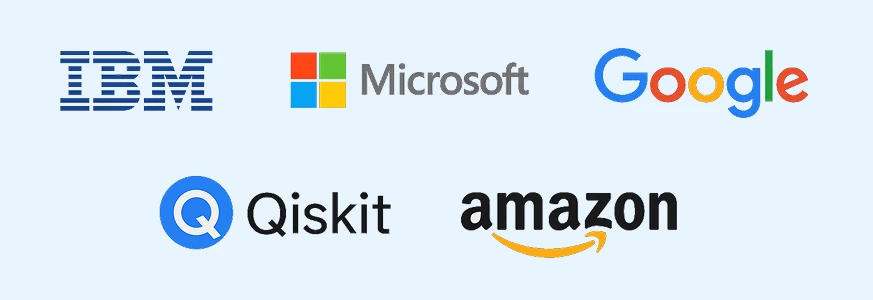
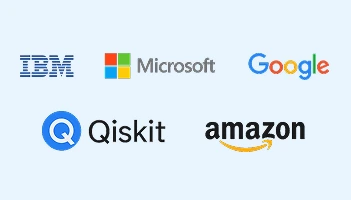
Conclusion
Quantum computing is moving closer to real-world use, and developers who start learning now will be ready for the next wave of technology. By understanding quantum concepts, tools, and applications, you can prepare for new opportunities in software development. If your organization wants to explore this space or begin the transition, Brevity Technology Solutions can guide you at every step. Book a free consultation today to get started!
Want to explore more on this topic? Read our insight on Quantum Computing and Its Impact on Software Development, where we talk about how quantum technology is moving from research into real-world industries like finance, healthcare, and cybersecurity, and how it’s changing the way we build software.
Related Post
-
F
-
A
-
Q
Quantum computing uses quantum bits, or qubits, which can handle more complex data than classical bits. This allows quantum computers to solve certain problems faster than regular computers.
No. While some physics knowledge helps, many quantum programming tools are built for developers without an advanced science background.
Popular quantum programming languages include Q#, Python (with libraries like Qiskit), and Cirq.
Quantum computers are useful for complex problems in cryptography, drug discovery, financial modeling, machine learning, and supply chain optimization.
Many platforms offer free access to small quantum machines. For larger, more powerful use, companies pay cloud-based usage fees.
Yes. As the technology grows, companies are hiring developers with basic knowledge of quantum tools and algorithms.
Basic Python, linear algebra, and an understanding of quantum gates and circuits are helpful.
Yes. Thanks to cloud access, even startups and small companies can run quantum simulations or test ideas.
Yes. IBM’s Qiskit, Microsoft’s Quantum Development Kit, and Google Cirq are available with free tutorials and cloud access.
The field is growing fast, and developers who learn early will have an edge when more companies start using quantum systems.
Want to Scale
Your Business? Let’s Meet & Discuss!

CANADA
30 Eglinton Ave W Mississauga, Ontario L5R 3E7

INDIA
3rd floor Purusharth Plaza, Amin Marg, Rajkot, Gujarat. 360002
Get a Quote Now
Let's delve into a thorough understanding of your challenges and explore potential solutions together


